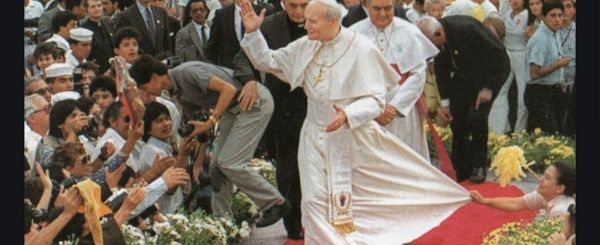2. These divisions are seen in the relationships between individuals and groups, and also at the level of larger groups: nations against nations and blocs of opposing countries in a headlong quest for domination. At the root of this alienation it is not hard to discern conflicts which, instead of being resolved through dialogue, grow more acute in confrontation and opposition.
Careful observers, studying the elements that cause division, discover reasons of the most widely differing kinds: from the growing disproportion between groups, social classes and-countries, to ideological rivalries that are far from dead; from the opposition between economic interests to political polarization; from tribal differences to discrimination for social and religious reasons. Moreover, certain facts that are obvious to all constitute as it were the pitiful face of the division of which they are the fruit and demonstrate its seriousness in an inescapably concrete way. Among the many other painful social phenomena of our times one can noted.
- The trampling upon the basic rights of the human person, the first of these being the right to life and to a worthy quality of life, which is all the more scandalous in that it coexists with a rhetoric never before known on these same rights.
- Hidden attacks and pressures against the freedom of individuals and groups, not excluding the freedom which is most offended against and threatened: the freedom to have, profess and practice one's own faith.
- The various forms of discrimination: racial, cultural, religious, etc.
- Violence and terrorism.
- The use of torture and unjust and unlawful methods of repression.
- The stockpiling of conventional or atomic weapons, the arms race with the spending on military purposes of sums which could be used to alleviate the undeserved misery of peoples that are socially and economically depressed.
- An unfair distribution of the world's resources and of the assets of civilization, which reaches its highest point in a type of social organization whereby the distance between the human conditions of the rich and the poor becomes ever greater.(2) The overwhelming power of this division makes the world in which we live a world shattered(3) to its very foundations.
Moreover, the church-without identifying herself with the world or being of the world-is in the world and is engaged in dialogue with the world.(4) It is therefore not surprising if one notices in the structure of the church herself repercussions and signs of the division affecting human society. Over and above the divisions between the Christian communions that have afflicted her for centuries, the church today is experiencing within herself sporadic divisions among her own members, divisions caused by differing views or options in the doctrinal and pastoral field.(5) These divisions too can at times seem incurable.
However disturbing these divisions may seem at first sight, it is only by a careful examination that one can detect their root: It is to be found in a wound in man's inmost self. In the light of faith we call it sin: beginning with original sin, which all of us bear from birth as an inheritance from our first parents, to the sin which each one of us commits when we abuse our own freedom.
3. Nevertheless, that same inquiring gaze, if it is discerning enough, detects in the very midst of division an unmistakable desire among people of good will and true Christians to mend the divisions, to heal the wounds and to re-establish at all levels an essential unity. This desire arouses in many people a real longing for reconciliation even in cases where there is no actual use of this word.
Some consider reconciliation as an impossible dream which ideally might become the lever for a true transformation of society. For others it is to be gained by arduous efforts and therefore a goal to be reached through serious reflection and action. Whatever the case, the longing for sincere and consistent reconciliation is without a shadow of doubt a fundamental driving force in our society, reflecting an irrepressible desire for peace. And it is as strongly so as the factors of division, even though this is a paradox.
But reconciliation cannot be less profound than the division itself. The longing for reconciliation and reconciliation itself will be complete and effective only tot he extent that they reach-in order to heal it-that original wound which is the root of all other wounds: namely sin.
26. Now if the church is the pillar and bulwark of the truth' (1 Tim 3:15) and is placed in the world as mother and teacher, how could she neglect the task of teaching the truth which constitutes a path of life?
From the pastors of the church one expects, first of all, catechesis on reconciliation. This must be founded on the teaching of the Bible, especially the New Testament, on the need to rebuild the covenant with God in Christ the redeemer and reconciler. And in the light of this new communion and friendship, and as an extension of it, it must be founded on the teaching concerning the need to be reconciled with one's brethren, even if this means interrupting the offering of the sacrifice. Jesus strongly insists on this theme of fraternal reconciliation: for example, when he invites us to turn the other cheek to the one who strikes us, and to give our cloak too to the one who has taken our coat, or when he instills the law of forgiveness: forgiveness which each one receives in the measure that he or she foresee forgiveness to be offered even to enemies, forgiveness to be granted seventy times seven times, which means in practice without any limit. On these conditions, which are realizable only in a genuinely evangelical climate, it is possible to have a true reconciliation between individuals, families, communities, nations and peoples.
[Pope John Paul II, exhortation Reconciliatio et Paenitentia, nn,2-3.26]












